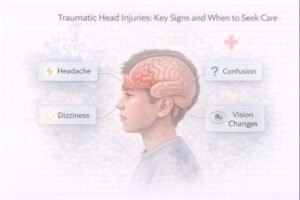Traumatic Head Injuries: Key Signs, Severity & When to Seek Care

A head injury may involve an open injury (fracture of the skull) or a closed injury. In clinical settings, severity is commonly evaluated using the Glasgow Coma Scale to help determine impairment and guide care.
Mild Traumatic Brain Injury
Individuals with mild TBI may experience:
-
Temporary loss of consciousness (not always present)
-
Short-term amnesia before or after impact
-
Headache, dizziness, fatigue or confusion
-
Sensory changes (blurred vision, ringing in ears, altered taste)
-
Mild concentration or mood changes
Some mild injuries can evolve, such as epidural hematomas, where symptoms may initially be subtle before worsening.
Moderate Traumatic Brain Injury
Moderate TBI may involve:
-
Persistent or worsening headache
-
Slurred speech
-
Limb weakness or unsteady balance
-
Longer loss of consciousness than mild cases
-
Possible cerebrospinal fluid (CSF) leakage from ears or nose
-
Loss of hearing or smell in some cases
These injuries typically require medical evaluation and ongoing observation.
Severe Traumatic Brain Injury
Severe cases can result in lasting disability and may include:
-
Difficulty waking
-
Loss of coordination
-
Convulsions
-
Extended amnesia
-
Progressive neurological decline
-
Elevated intracranial pressure
Severe TBI is a medical emergency and often requires specialized acute care.
Canadian Context
Sports-related concussion and cycling injuries are significant contributors to pediatric TBI across Canada. Early recognition, safe return-to-play protocols and proper protective gear can reduce long-term impacts.
When to Seek Immediate Medical Care
Urgent medical evaluation is recommended for:
-
Loss of consciousness
-
Repeated vomiting
-
Increased confusion or agitation
-
Seizure-like activity
-
Blurry or double vision
-
Speech or balance difficulty
-
Severe or worsening headache
-
Clear fluid leaking from ears/nose
Symptoms may take hours to develop, so observation is important.
Workplace & Safety Relevance
Head injuries also occur in Canadian workplaces. Proper PPE, hazard recognition and certified first aid training support early recognition and rapid response — improving outcomes in both professional and community settings.
Disclaimer: This material is for learning only and does not replace professional medical assessment, emergency care or certified first aid/CPR/AED training.
